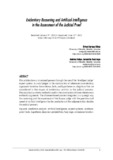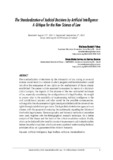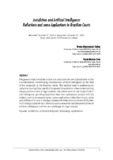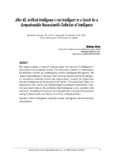Evidentiary Reasoning and Artificial Intelligence in the Assessment of the Judicial Proof
Razonamiento probatorio e inteligencia artificial en la valoración de la prueba judicial;
Raciocínio probatório e inteligência artificial na valorização da prova judicial
Compartir este ítem
Fecha
2022-12-06Autor
Vargas, Orión
Jaramillo Restrepo, Andrés Felipe
Citación
Metadatos
Mostrar el registro completo del ítemDocumentos PDF
Resumen
This article shows a structured process through the use of the Intelligent Judge expert system, to assist judges in the construction of inferences or evidentiary arguments based on the evidence, facts, and hypotheses or allegations that are considered in the stages of evidentiary activity in the judicial process. The analytical-synthetic method is used in the construction of these inferences or evidential arguments. The aforementioned process integrates, in a synergic way, the reasoning and the experience of the human judge with the precision and speed of artificial intelligence for the production of the judgement that decides the judicial process. El presente artículo muestra un proceso estructurado, mediante el uso del sistema experto Juez Inteligente , para asistir a los jueces en la construcción de inferencias o argumentos probatorios a partir de las pruebas, hechos e hipótesis o alegatos que se consideran en las etapas de la actividad probatoria en el proceso judicial. En la construcción de estas inferencias o argumentaciones probatorias se utiliza el método analítico-sintético. Dicho proceso integra, de forma sinérgica, el razonamiento y la experiencia del juez humano con la precisión y rapidez de la inteligencia artificial para la producción de la sentencia que decide el proceso judicial. O presente artigo apresenta um processo estruturado, através do sistema experto Juiz Inteligente , para ajudar aos juízes na construção de inferências ou argumentos probatórios a partir das provas, fatos e hipóteses ou alegações que são considerados nas etapas da atividade probatória no processo judicial. Na construção dessas inferências ou argumentações probatórias utiliza-se o método analítico-sintético. Este processo integra, de forma sinérgica, o raciocínio e a experiências do juiz humano com a precisão e rapidez da inteligência artificial para a produção da sentencia que decide o processo judicial.
Colecciones
Excepto si se señala otra cosa, la licencia del ítem se describe como Attribution-NonCommercial-ShareAlike 4.0 International
Ítems relacionados
Mostrando ítems relacionados por Título, Autor o Palabra clave.
-
The Standardization of Judicial Decisions by Artificial Intelligence: A Critique for the New Science of Law
Boniatti, Matheus; Mello Correa de Barros, Bruno (MedellínUniversidad de MedellínFacultad de Derecho, 2022-12-20)The standardization of decisions by the informatics of law, aiming at an exact science would result in a science in which progress and transformations would not drive the emergence of new rights or the readjustment of those ... -
Jurisdiction and Artificial Intelligence: Reflections and some Applications in Brazilian Courts
Makowiecky Salles, Bruno; Cruz, Paulo Márcio (MedellínUniversidad de MedellínFacultad de Derecho, 2022-12-21)The general objective of the article is to articulate the role of jurisdiction within a contemporary transforming circumstance: artificial intelligence in the field of law, especially in the Brazilian reality. The method ... -
After All, Artificial Intelligence is not Intelligent: in a Search for a Comprehensible Neuroscientific Definition of Intelligence
Divino, Sthéfano (MedellínUniversidad de MedellínFacultad de Derecho, 2022-12-20)This paper explores a series of thoughts about the meaning of intelligence in neuroscience and computer science. This work aims to present an understandable definition that fits our contemporary artificial intelligence ...





